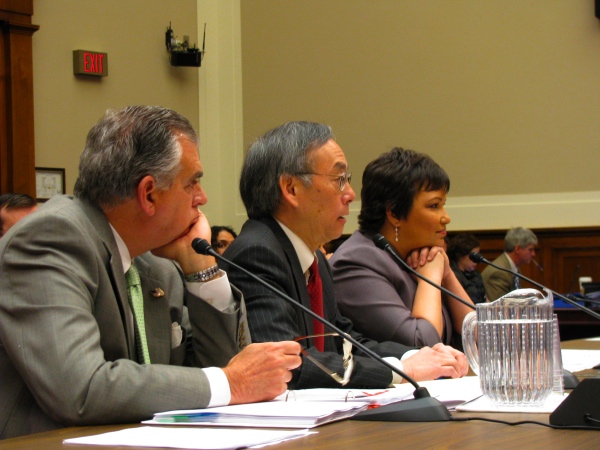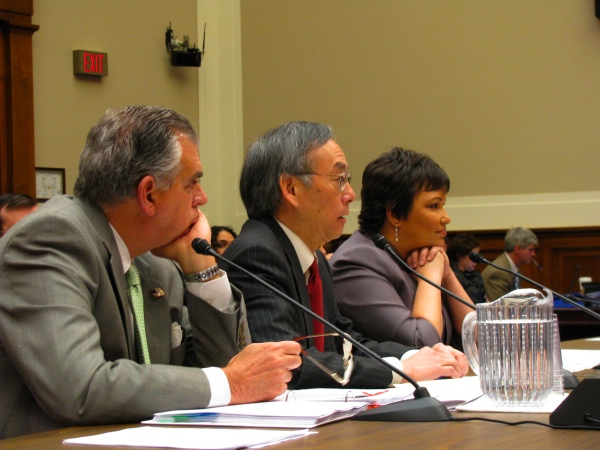Though corporate leaders from across the country came to the House Energy and Commerce Committee on Wednesday asking representatives to put a cap on carbon, leading Republicans on the committee held firm in their contention that mandating emission reductions would be catastrophic for the nation’s economy.
The first full day of hearings on the proposed Waxman-Markey climate bill found Republican members repeating thoroughly debunked claims about how much a cap-and-trade plan would cost American households, even as leaders from some of the country’s biggest companies joined the EPA administrator in arguing that limits on carbon would benefit the country in the long run.
“If we design this bill right, if we get the transitions right, it will put us in a position to be stronger. It will not weaken our economy over time,” Jim Rogers, CEO of Duke Energy, told the committee in his testimony. “It won’t be easy, it won’t be quick, but it must be fair, and it must be now.”
Still, Republicans on the panel argued that the bill would be dangerous. “A cap-and-tax, cap-and-trade will essentially kick American families when they’re down,” said Fred Upton (R-Mich.). “I do believe that we need to reduce emissions, but it needs to be done in a commonsense way that takes into account the economic and global realities of the issue.”
Getting down to business
The panel of business leaders gave insight into how the bill might be shaped going forward, if they have their way.
Rogers testified on behalf of the United States Climate Action Partnership, the coalition of business and environmental groups whose blueprint for climate action served as a model for the House bill now being debated.
He was joined on the panel by fellow USCAP members Charles Holliday, chairman of DuPont; Red Cavaney, senior vice president for government and public affairs for ConocoPhillips; Meg McDonald, director of global issues for Alcoa Inc.; David Crane, CEO of NRG Energy; and Frances Beinecke, president of the Natural Resources Defense Council. Though some expressed concerns with specific components of the bill, the entirety of the panel called for the committee to pass a cap-and-trade plan this year. “In the long run, I think it will help us be more competitive,” said Holliday.
But their testimony didn’t persuade Republicans on the panel, who insisted that the bill would drain jobs from the economy. Ralph Hall (R-Texas) warned that it would weaken U.S. competitiveness on a global scale.
That’s not to say USCAP members were entirely keen on the draft bill at this point. Rogers argued that its renewable energy standard is too stringent and states should be allowed to set their own goals. He also expressed concern about the program kicking in by 2012, and suggested to reporters afterwards that a five-year window before it goes into effect might be more appropriate.
All of the business leaders called for a significant portion of carbon credits to be distributed free of cost in the early years of the cap-and-trade program, saying it was essential to help businesses successfully shift gears. “We’ve got to get the transition right, or it could have a devastating effect on our economy,” said Rogers. “The whole sport is around whether we get the transition right.”
The current draft of the bill doesn’t address the question of what proportion of credits to auction off versus hand out to polluters, which will be a highly contentious issue going forward. The Obama administration has said it wants 100 percent auction, while the committee’s Democratic leadership has indicated that the final product is likely to be a balance between auctions and allocations. Cavaney of ConocoPhillips called for the entirety of the credits to be distributed free of cost in at least the first year of the program. NRG’s Crane said his company would not support the bill if it was all auction.
Bill coauthor Ed Markey (D-Mass.) has said this aspect of the bill was left open-ended so committee members and interested parties like USCAP could weigh in. But this approach has rankled Republicans on the committee. Ranking member Joe Barton (Texas) accused the majority of “trying to buy votes” in the process of determining how to give away allowances. John Shimkus (R-Ill.) alleged that the lack of specifics is an “intentional move to deceive us so we can’t do the cost-benefit analysis.”
Beaming in from Obamaland
During another panel session, EPA Administrator Lisa Jackson, Energy Secretary Steven Chu, and Transportation Secretary Ray LaHood offered the Obama administration’s support for the legislation. “Three important players in this issue, that represent the president, believe the principles laid out in the bill are very strong and are principles the president and his team can work with,” LaHood told reporters following their testimony.
Jackson was asked how the EPA had been able to estimate the costs of the bill to American households — $98 to $140 a year, or 27 cents to 38 cents a day — even though the measure is incomplete. She said the agency based its figures on the assumption that approximately 40 percent of auction revenues would be returned to consumers through rebates.
“The EPA’s economic analysis shows that there are no harbingers of huge job loss in this bill,” said Jackson. “Nothing is free,” she continued, but the administration believes there will be only “modest impacts.” If anything, Jackson said, EPA modeling tends to err on the conservative side and overestimate costs.
Jackson said the administration is willing to collaborate with Congress to develop an allocation and auction scheme. “Though [President Obama] has called for 100 percent auction, he looks forward to working with this committee … and believes that these allowance questions can be addressed,” she said.
Jackson was also asked about the EPA’s finding last week that carbon dioxide emissions are a danger to public health, which triggers the process of regulating the pollutant under the Clean Air Act. While Jackson acknowledged that the agency is beginning that regulatory process, she made it clear that EPA rules would take months to finalize. She said the administration would prefer that Congress pass a new bill directly addressing the issue — but that doesn’t mean it’s going to wait around.
“The race is clearly on and time is of the essence,” she told reporters.
And this is only the beginning …
There were four separate panels on the climate bill on Wednesday, involving 21 witnesses. The fourth was added at the last minute to accommodate witnesses whom the minority members of the panel had requested, including representatives from conservative outposts like the Heritage Foundation, the Competitive Enterprise Institute, and the American Enterprise Institute. The hearings stretched on for more than 10 hours, and by the end, as few as four members of the committee were actually present to hear testimony.
The day certainly had its theatrics — especially from the committee’s resident climate skeptics. Shimkus was one of the more dramatic participants, raising his voice at several points.
“This is the largest assault on democracy and freedom in this country that I’ve every experienced,” he said during the day’s first panel. “I’ve lived through an impeachment, two wars, terrorist attacks … I fear this more than any of the above activities.”
But the Democratic leadership of the panel seems to be taking it for granted that they’ll be able to pass a bill out of their committee in the next five weeks, even if it’s still not entirely clear what that bill will look like.
“It is no longer a question of whether we will act to reduce CO2 emissions,” said Chairman Henry Waxman (D-Calif.). “The real question is whether we will do so in a way that strengthens our economy, creates new jobs, and ends our dangerous dependence on foreign oil.”





